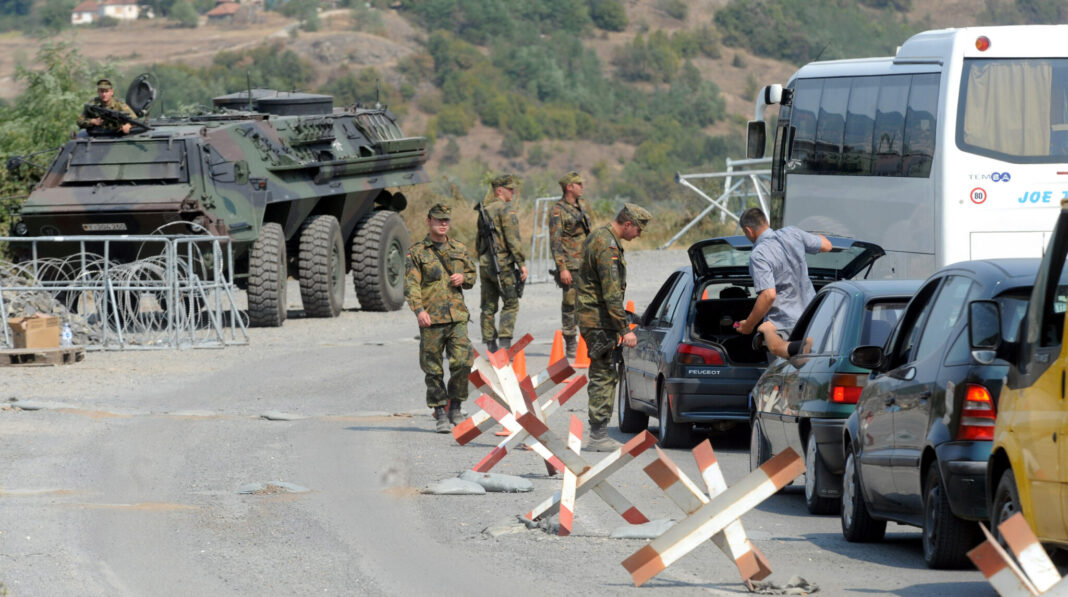by Alessandro De Pascale
Saturday 23rd September, night. Northern Kosovo, on the border with Serbia. Enclaves where the Serbian minority, which remains in the country under the protection of NATO, lives segregated in an Albanian-majority state that unilaterally declared independence in 2008, as part of the Balkan wars that ended the former Yugoslavia.
In Banjska, a commando of Serb terrorists stormed a village and barricaded themselves in a monastery under the jurisdiction of the Serbian Orthodox Church (near Zvecan), in a municipality where violent clashes had already broken out last May. When the police intervened, a Kosovar policeman was killed. The death toll is high. In the raid carried out that night, the authorities in Pristina also lost the lives of seven of the terrorist commando’s attackers, while four others were arrested. The main border crossings with Serbia were immediately closed and gun battles continued throughout Sunday, amidst torched lorries and improvised barricades.
According to the Kosovo government, the group holed up in the monastery consisted of around 30 people. “They spoke Serbian, were military professionals, wearing masks and different uniforms, equipped with heavy weapons, grenades and backed by armoured vehicles without number plates, the authorities in Pristina said.
Prime Minister Albin Kurti bluntly described them as “men supported by Vucic”, the Serbian President, with whom the Albanian Prime Minister of Kosovo held talks at the European Forum on 14 September that failed miserably, in a desperate attempt to calm tensions that have been exploding again and again for more than six months, with various notable episodes (Serbian raids, shootings, roadblocks and threats). With the passage of time, the situation between the two countries and their constituent ethnic groups seems to be deteriorating in an escalation of tensions with no end in sight.
In this crisis, Kosovo’s international backers seem completely powerless. Pristina’s main backers are the European Union, which, through the EULEX mission, has created, trained and financed the institutions of this young nation, formerly a province of Serbia, whose official currency is the euro, although it is not part of the euro zone. But above all, on the ground, there is the Atlantic Alliance, which fought in the 1998-1998 armed war of independence, Operation Allied Force, on the side of the Albanians of the UCK (Ushtria Çlirimtare e Kosovës), considered a terrorist organisation by the UN, and which also violated Serbian sovereignty over these territories.
There are still 3,800 NATO troops on the territory of Kosovo, where the Atlantic Alliance’s KFOR mission was launched in June 1999. All this in the context of a conflict that, according to the UN High Commissioner for Refugees, has produced 31,731 refugees, most of whom have been received in France (17,972). Of the 1.8 million inhabitants, 92 per cent are currently ethnic Albanians, while the remaining Serbs make up only 6 per cent.
Virtually all of them live in the northern part of the country, in NATO-protected enclaves where signs and street signs are in Cyrillic, Serbian dinars are almost exclusively accepted as payment, and vehicles drive around without number plates in protest at flying the flag of a state born out of nothing that they do not recognise.
Kosovo has never been recognised by Serbia and Russia, nor by some EU countries such as Spain. The economy is one of the least developed in Europe, while youth unemployment is around 50 per cent. Crime and corruption are rife, while top politicians from the ranks of the Kosovo Liberation Army, better known as the KLA (starting with former Kosovo President Hashim Thaci), have ended up in jail in the Netherlands and on trial in The Hague, accused by the International Criminal Court (ICC) of war crimes and crimes against humanity.
For Kosovo’s Prime Minister Kurti, the violence of the past few hours has turned Kosovo into “a playground for the geopolitical games of Russia and China”, which support Serbia. For the President of Kosovo, Vjosa Osmani, “the attacks on KFOR members, journalists and citizens are destabilising Kosovo and the entire region”. Belgrade, for its part, has not commented on the incident. However, Serbian Prime Minister Aleksandar Vucic reiterated that “we will never recognise an independent Kosovo. They can do anything to us, but Serbia will never recognise an independent Kosovo”. In short, Belgrade said it was ready to negotiate as always, but “you can forget about recognising Kosovo”, PM Vucic told Brussels.
The European Union and NATO have declared their readiness to intervene if necessary. The former, of course, on a political level, the latter, of course, with its own military force, which has been deployed on the territory of this small Balkan country since the early hours of 12 June 1999 (Kosovo covers an area of 10,887 km², the size of Abruzzo, a region in central Italy).
The Serb minority, ghettoised in NATO-protected enclaves in the north since the end of the conflict, had stayed away from local elections last May and later took to the streets to protest against the election of new ethnic Albanian mayors and to demand the withdrawal of Kosovar police units from their areas. Several dozen military and civilian personnel were injured in the ensuing clashes.
By April 2022, tensions had already risen over the issue of number plates. At the bridges over the Ibar river in the city of Mitrovica (70,000 inhabitants), which symbolically and de facto divide the Albanian-majority south from the Serb-majority north, where vehicles are driven without number plates in protest as mentioned above, even the attempt to introduce a test plate had caused tensions to flare up again, later mediated by the European Union.
To learn more, read our Kosovo conflict factsheet
On the cover photo, checkpoint of the NATO soldiers of the KFOR mission at the Jarinje border crossing © bibiphoto/Shutterstock.com
























